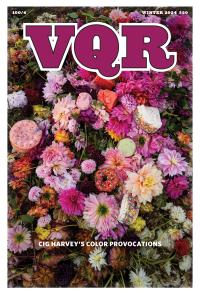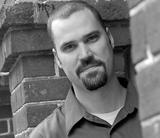
Top 10 Poetry Books of 2008
So it’s almost 2009 (good riddance ’08), and I’ve decided to assemble a list of the best poetry books of the year. Why poetry books? Because there have been very few year-end round-ups of poetry—most lumping a book or two into “literature” lists. Also, I’ve read a lot of compelling collections this year and felt like a number have not received their due. One other note before I begin: VQR launched its poetry series in partnership with the University of Georgia Press this year, publishing six very strong collections—well, five very strong collections and my own; those books have not been considered for the list, but you should buy them and read them.
Okay, here goes…
1. Kevin Prufer, National Anthem (Four Way)
This is the collection of the year so far as I’m concerned. These poems look back on America from a not-so-distant future during and after the apocalypse that toppled our empire. Prufer’s speaker shuttles between anger and ironic bemusement as he catalogs visions of destruction and the survival of the worst of us. When the speaker sets off to find what’s left of America, for example, only the Motel 6 and Waffle House seem to be thriving. It’s like Omega Man meets The Waste Land—which is to say that’s it’s a biting social critique of our times, but it also feels legitimately visionary (and scary).
2. Chris McCabe, Zeppelins (Salt)
McCabe was one of this year’s two revelations for me. The brilliant Anglo-Saxon cacophony of his poems is held together by formal constraints in a way that reminded me, at times, of Glyn Maxwell’s The Breakage. But McCabe’s poems feel even more urgent—especially in verses about the London tube bombing, Abu Ghraib, and the amazing titular work about the Zeppelins over London during WWI, all counterpointed against the pop culture we use to distract ourselves from the terrors of modern life in the city.
3. C. D. Wright, Rising, Falling, Hovering (Copper Canyon)
In a collection that hearkens back to the heyday of Modernism (and such Lefty heirs as Muriel Ruykeyser), when formal experimentation and social critique were one and the same, Wright creates a multi-voiced narrative that skips from Iraq to Mexico to the United States—examining our eagerness to invade even as we “build the great wall between us.” Hard on the heels of One Big Self (which used the same fragmented narrative style to investigate America’s prison system), Wright has become the conscience of American poetry.
4. Dan Bellm, Practice (Sixteen Rivers)
Bellm was the year’s other revelation. I had never read his first two collections, but I was enthralled by this one. In the tradition of midrash, these poems answer or elaborate particular passages from the Torah—but often filtered through contemporary culture (ranging from Neruda to Weegee) and an impressive range of poetic forms. Especially stunning is the sonnet sequence “Book of Numbers (A war diary),” obsessed with how wars are tallied “as if the one who heard / all prayer were some diligent American God, / numbering the living and the dead.”
5. Aaron Baker, Mission Work (Houghton Mifflin)
This debut collection narrates Baker’s remarkable boyhood—as the son of missionaries living in the Chimbu Highlands of Papua New Guinea. The poems explore the child’s confusion between Eastern and Western religions, between the rituals of the Kuman people and his Christian parents. Baker’s language is lush and the imagery singular, but it is the assured and complex structure—carrying us through the uncertain and unfamiliar by the force of his voice—that makes Mission Work such a surprise and delight.
6. Claudia Emerson, Figure Studies (LSU)
These poems trace the eerie and unpredictable path from girlhood to becoming a woman. But Emerson’s mind is wide-ranging and historical, not merely personal, so the book stretches from the opening sequence about an all girls school to dramatic monologues of women commenting on other women to poems in the voices of girls attempting to understand the lives of adult women. Emerson’s sharp eye and unerring ear make for chiseled lyrics in which not a word is wasted.
7. Todd Boss, Yellowrocket (Norton)
At times, Boss’s rapid-fire rhymes and hairpin turns of juxtaposition can feel like a runaway train, but the poet is in full control here. And the sounds and images that bounce us from the Wisconsin farm where he grew up to the literal storm that wiped it out to the figurative storm of a marriage jump adeptly and movingly from mere play to grave epiphany. A selection of the poems from the first section of the book appeared in VQR—and just received our Emily Clark Balch Prize for Poetry.
8. Katie Ford, Colosseum (Graywolf)
Ford’s impressive second book is an extended meditation on destruction and ruins in the wake of Katrina’s devastation of New Orleans. She moves from the broken levees to the Biblical flood, from the Superdome to the Roman Colosseum. She struggles against impermanence in direct, haunting language: “we will be overcome by waters / where I stand with my lanterns and cans, / with my useless preparations and provisions, / with the God I loved, I hated, and you.” These are poems worthy of their subject—which is saying a lot.
9. Fady Joudah, The Earth in the Attic (Yale)
Joudah is a Palestinian-American physician and, since 2001, a field member of Doctors Without Borders. Not surprisingly, many of his poems blend reportage with personal lyrics. At times, everything can look like war—“After the rain has bombed the earth // The ants march out of their shelters / One long frantic migration line”—but more often, the imagery of healing finds its way into scenes of devastation, as in “Pulse,” in which the poet sits with a mother after her baby has died in her arms: “We talked back towards each other, we met, we / Read verses from the Quran / Our palms open / Elbows upright like surgeons.”
10. Chad Davidson, The Last Predicta (Southern Illinois)
I’m constantly asking where the cell phone is in American poetry—which is to say, the detritus and barrage of our consumer culture that too many poets pretend doesn’t exist. Well, there are no cell phones here, but there are poems for Gold’s Gym and the last Predicta television. But, like Todd Boss, it’s the power of Davidson’s wordplay and nimble imagination that keep these poems from lapsing into jokes. Of Target (yes, the chain store), he writes: “I love you dearly, // dear church of the cherished storage bin, / dear Cheerios and the bowl to drown you in, // dear warehouse sky, dear reindeer aiming the beads / of your eyes at my impulse buys.”
Honorable Mentions
Idra Novey, The Next Country (Alice James)
Rick Barot, Want (Sarabande)
James Allan Hall, Now You’re the Enemy (Arkansas)
Brenda Shaughnessy, Human Dark with Sugar (Copper Canyon)
Colette LaBouff Atkinson, Mean (Chicago)
Devin Johnston, Sources (Turtle Point)

